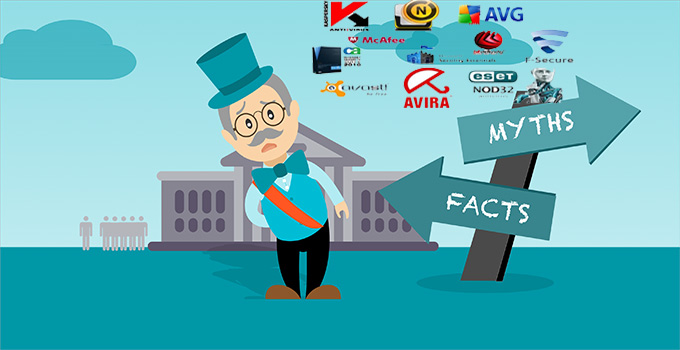
Antivirus software, also known as anti-malware, is a computer program used to prevent, detect, and remove malware. Antivirus softwares were originally developed to detect and remove computer viruses. However, with the proliferation of other kinds of malware, antivirus software started to provide protection from other computer threats including malicious browser helper objects (BHOs), browser hijackers, ransomware, keyloggers, backdoors, rootkits, trojan horses, worms, malicious LSPs, dialers, fraud tools, adware and spyware. Some products also include protection from other computer threats, such as infected and malicious URLs, spam, scam and phishing attacks, online identity (privacy), online banking attacks, social engineering techniques, advanced persistent threat (APT) and botnet DDoS attacks. app development companies must be deliberate about installing antivirus on their systems.
Top 5 Myths About Installing an Antivirus For Your PC
There are some myths around installing antivirus on a computer.
Installing anti-virus slows down/improves the speed of your PC
A popular myth is that antivirus makes computers slow. This is not true, as modern encryption methods barely utilize any resources, and so will not make the system slow. A system may be slow because there are many redundant activities occurring at the same time resulting in an overlap that slows a system down. A system may also be slow if it is running a solution and does not meet its minimum system requirements.
Another common myth is that antivirus will somehow speed up your computer. If your device already has a virus or malware, removing the infection can restore its performance. Antivirus barely utilise any resources on the computer and antivirus software will not affect the speed of your system.
You do not visit the internet/visit only safe sites
Some people think that if they do not visit the internet, they are protected from viruses. There are hundreds of file extensions that can be infected by viruses, and if you are sharing information with other devices, you should have antivirus installed.
Some also think that the websites that they visit are safe, and so they do not need any antivirus devices. Viruses and hackers have found ways to infiltrate even the most secure websites and connections in the recent past. There have been numerous drive-by downloads, DDoS attacks, password breaches, SSL breaches and more to convince us that completely secure websites are now a thing of the past. Hackers are constantly innovating to find new ways to breach databases and websites, so the antivirus industry and PC users need to be aware and updated at all times. It is difficult to truly classify a website as completely safe. A recent study by Symantec shows that you are more likely to get a virus from a church site than from an adult site. Adult sites are businesses run by professionals, and they are deliberate about making sure the business runs well. Church sites are often run by volunteers, and they may not daily monitor the church site for break-ins by hackers uploading viruses.
If you are exchanging emails, downloading content, streaming videos, carrying out banking transactions or shopping online, you should consider installing antivirus against malware, cyberattacks and social engineering tricks.
Antivirus detecting several threats is better than one detecting less threats
Detection rate alone is not a strong parameter in judging the antivirus – it may simply be a sign of false positives. Detecting viruses is not the same as removing it. An anti-virus may not be able to remove all threats, and you have to manually remove the virus through a review of system files, registry and logs analysis.
Installing Two Security Software Is Double Protection
Running two antivirus systems at the same time may hinder the performance of a system, as the antivirus may work in different ways, negate the impact of the other, or cause redundancy. A single, efficient antivirus is sufficient to combat cyber threats.
Installing anti-virus protects me
Unfortunately, the worms, the hoax, the backdoors of trojans and many other forms of contamination may fool the best antivirus software on the market. You should make sure that the antivirus you have is properly installed, effective and up-to-date to ensure it combats viruses.
On a final note, the free version of an anti-virus is not sufficient. Free antivirus are stripped-down versions of an effective antivirus, offering only minimal protection. There is no support or barely any support. In using antivirus, ensure to use the most updated version of the antivirus to get the best results on your system. An ecommerce development company must be deliberate about antivirus systems that they work with.


